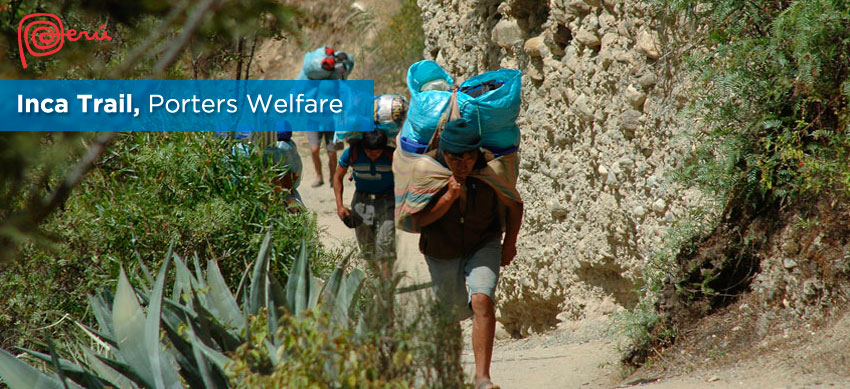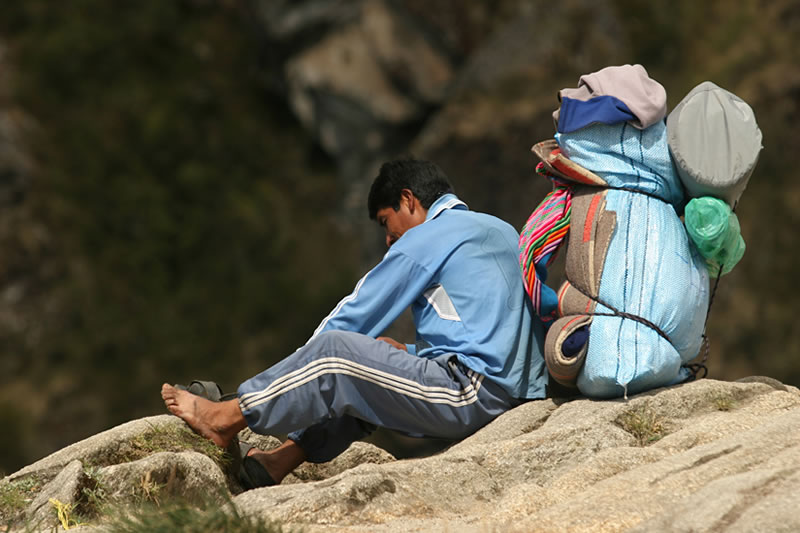
The porters are the most industrious workers during the Inca Trail to Machu Picchu. Their role is to carry the necessary utensils for this route on their backs: tents, sleeping bags, kitchen implements and others. They, for the most part, come from the most remote villages of Cusco. They are fluent in Spanish and Quechua, their native language. Without them this hiking trail would be a failure.
The Inca Trail to Machu Picchu is a hiking route that can only be done through a tour organized by a tourism agency. The necessary equipment for this walk includes the work of: cooks, tour guide and porters. The latter are essential since they carry all the tent utensils, sleeping bags, ingredients and kitchen equipment. By law, porters can carry a maximum of 14 kilos. The number of porters depends on the number of tourists. It should be noted that horses or mules cannot be used on this route since they damage the historic Inca roads.
Who are the porters?
The porter is the person who works for travel agencies and has the function of transporting on his back: tents, kitchen equipment, food, tables, benches, gas balloons and more.
All these products are necessary to prepare the camps on the Inca Trail: tents, dining room, kitchen, etc.
In other words, he is the person who carries everything necessary to set up the camps during the trek to Machu Picchu. Likewise, it can optionally help with backpacks and ease the visitor’s walk.
The porters are from Cusco from the high Andean areas. Most are Quechua speakers. Some are bilingual (Spanish and Quechua). They are people who work in the fields, who have seen a smart way to increase their income, working as “porters” on the Inca Trail.
In some alternative routes to Machu Picchu, pack animals are used to carry the equipment. However, on the Inca Trail it is forbidden to bring animals. This in order to protect the original route. It is for this reason that the services of the porters are required.
What does the porter’s job consist of?
The porter is the most important worker of the entire team of professionals who will accompany you during your walk.
This support staff is responsible for setting up the camp that has to be ready upon the arrival of the group of tourists. However, they leave at the same time as the group of tourists and carry more weight (14 kilos maximum).
How do they go so fast and carry so much weight? During the walk the porters go at a brisk pace, they surpass the groups, even some sections do it running. In this way, they manage to get ahead and fulfill their work in a timely manner.
The porters also have extensive experience. To gain energy they chew coca leaf, a natural plant that provides energy to walkers.
The regulation of the work of the carrier
The tourist use of the Inca Trail intensified in the 1980s. At this time, the first porters began to work. Then there was no regulation for the use of the Inca Trail. Therefore, there was also an abuse of these workers who were exploited, carrying a lot of weight (40 kilos in extreme cases).
In 2002 Dircetur – Regional Directorate of Foreign Trade and Tourism with the support of other institutions issued the “Regulation of Tourist Use of the Inca Trail network of the Historic Sanctuary of Machu Picchu”. In said regulation, they considered the porters as support personnel. This led to regulate their employment situation and decent working conditions.
Among other aspects, the regulation considers the following points:
- The weight that the porters must carry is regulated to a maximum of 14 kilos, which is controlled during the journey.
- It is determined that the porters unionize and treat their salaries at this level, which must be in accordance with the law.
- They should be provided with adequate equipment to transport things, such as: jackets, backpacks, head protection, suitable shoes among other implements.
- As for the shoes, the porters hardly wear rubber sandals, called ‘flip flops’. Porters have used these footwear since they were children and, in many cases, it makes them uncomfortable to wear shoes.
- The porter must be registered in the Inca Trail Porters Registry, for this purpose he must present a Criminal Record Certificate and a Health Card.
- Travel agencies must comply with all the requirements established by the regulations.
How to collaborate so that the carrier has a decent job?
To collaborate with the porters and watch over their work. We must take into account the following recommendations:
- Avoid doing the Inca Trail for a very cheap price.
- Agencies that charge very low prices pay low prices to their employees.
- Check if the weight carried by the carrier is controlled by the park rangers (it should not exceed 14 kilos).
- Do not exceed 5 kilos in your luggage bag
- Ask the travel agency and make sure that it is complying with its porters as the regulations say
- You can request a personal porter. That way I would be giving extra work.
- Be friends with the carrier. This way you will have the option to learn about their culture and customs.
- If you are going to tip them it is better to give it directly without intermediaries.
- At the end of the trip testify if the good service of the porter was fulfilled.

Inca Trail Machu Picchu porter
More information about the porters
On the night of the third day, the porters say goodbye to the tourists through a small meeting with cocktails and cake. On that day, visitors usually tip the entire team that accompanied them on the Inca Trail (porters, cooks, and tour guide).
There are some tourism agencies that hire porters for the Inca Trail. This kind of inclusive service shows that this difficult task can be carried out by both men and women.
By Inca Trail Machu Picchu - Last updated, 22-08-2024
Interested in the Inca Trail? Know more about Reservation and Services!
- Inca Trail Travel Equipment
- Machu Picchu Tourist Packages
- This is the diet on the Inca Trail
- Cooks and food on the Inca Trail
- Passport for the Inca Trail?
- Documents required for the Inca Trail
